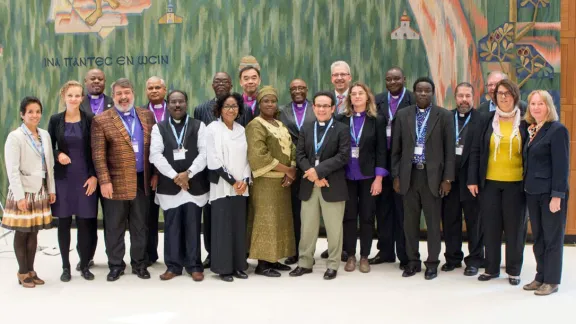
New church leaders who have formed a peer support network, seen here with communion office staff. Photo: LWF/S. Gallay
LWF induction program for new church leaders
(LWI) – A group of newly elected leaders among The Lutheran World Federation member churches have formed a peer support network to mutually accompany each other and minister to one another in times of need.
This is one of the outcomes of the Induction of Newly Elected Leaders pilot project. it is aimed at helping first-time heads of churches deepen their understanding and practice as transformative leaders, able to offer strong leadership to their churches and in the Lutheran communion.
Bishops and Presidents from 14 LWF member churches in Africa, Asia, Latin America and the Caribbean (LAC) are taking part in the 28 September to 9 October program that concluded its first phase in Geneva on 2 October, and continues in Wittenberg, Germany.
Geneva provided an opportunity to improve their knowledge of the operational work of the LWF Communion Office and its strategic alliances with other church organizations at the Ecumenical Center, and with the United Nations.
"We are not alone"
“Venezuela is a very small church in terms of human resources and because human resources are central, our challenge is how to grow when we are six or seven churches and barely five pastors,” said Rev. Gerardo Hands, President of the Evangelical Lutheran Church in Venezuela (IELV). “We are very grateful to the communion for the opportunity to work and share together, and the knowledge that we are not alone,” said the leader of the church with nearly 2,000 members.
Participants observed that formation as a pastor, while extensive, does not specifically equip one for the suddenly new role of “shepherding” the entire church. A crisis, for example, requires not only immediate but skilled approaches, which the new program offers.
“In Suriname, if you show your humanity or weakness as a pastor you are seen as not being a good pastor. Here we have been able to share our experiences, to network and it has been lovely to laugh with colleagues. It feels like we are one,” said Rev. Marjory Slagtand, chairperson of the Church Board of the Evangelical Lutheran Church in Suriname (ELKS).
A source of encouragement
For Rev. Dr Samuel Ndanga-Toué, President of the Evangelical Lutheran Church of the Central African Republic (EELRCA), the program is a source of encouragement, especially in a context of ongoing civil conflict in the case of CAR. “I have learnt so much about the LWF, about the World Council of Churches, and the kind of work that they are doing in the world,” he said. “I now feel better equipped to go back and be the leader of my church and better prepared to do the work that awaits me,” he added.
"I am thankful to the LWF for the opportunity to be part of the induction and to get to know other leaders of the member churches," said Rev. Antonio Reyes, President of the Lutheran Church in the Philippines. "Whether you are from a big church or a small church and regardless of your financial status, we are brothers and sisters standing together. We can help each other in times of hardship, be a source of encouragement and the assurance of the presence of God," he emphasized, referring also to the need for healing and reconciliation in the 18,000-member LCP after a divisive crisis.
“The success of the Geneva part of the induction is grounded in the participatory approach that allows participants to be engaged, listened to and included,” said Rev. Dr Patricia Cuyatti, LWF area secretary for LAC. “They were able to bring their own expectations as newly elected leaders who have a deep interest in serving their churches better and finding support among each other.”
In addition to the CAR, Philippines, Suriname and Venezuela, the leaders also represent the LWF member churches in Cameroon, Chile, Costa Rica, Guyana, two churches in India, Republic of Namibia, Rwanda, Senegal and Taiwan.
In Wittenberg, their discussions focus on leadership and management, communion building and conflict resolution.
(A contribution by Moyette Marrett)


